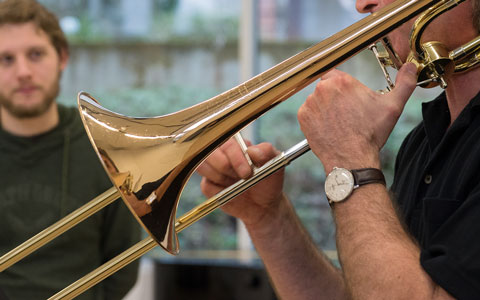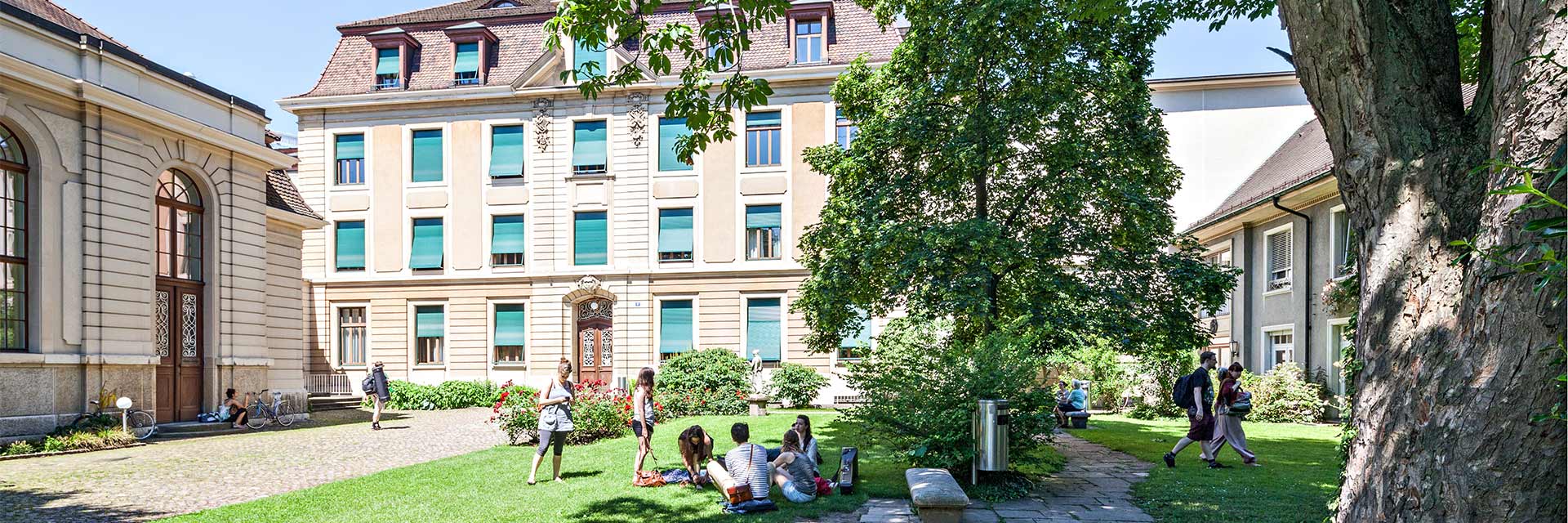Audiodesign
Study Creative Music Technology and Electronics in the cultural city of Basel in the border triangle of Switzerland, Germany and France! The Elektronisches Studio Basel and sonic space basel offer an inspiring, collaborative environment with a wide range of networking opportunities and space for artistic development.
Key data
- Degree
- Bachelor of Arts FHNW in Musik, Studienrichtung Audiodesign
- Studying type
- Full time
- ECTS points
- 180
- Study start
- Beginning of September
- Duration
- 6 semesters
- Teaching language
- German, B1 level in German required
- Place
- Campus Musik-Akademie Basel
- Stay abroad
- Possible, not curricular
- Application fee
- 200 CHF
- Semester fee
- 750 CHF (CH) | 1000 CHF (EU/EFTA) | 1250 CHF (Not-EU/Not-EFTA) More Fees
You may apply between 15th December and 1st March.
Mobile navi goes here!
- Study Creative Music Technology across the entire spectrum of composition-performance sound installation, recording studio technology, audiovisuals
- Practical work with the high-quality equipment of Elektronisches Studio Basel
- Closely coordinated subjects and many elective/specialisation options
What is Audio Design? How do we design electronic music?
Get to know the scope of the Audio Design Departement
The Bachelor of Arts in Music with a Audiodesign major lays the educational foundations for a career as a professional audio designer.
The aim of the study programme is to nurture and produce versatile and multifaceted musical personalities. To this end, students will build on their knowledge of electronics and relevant technologies, as well as acquire sound general music education knowledge and skills. They will also have a well-developed ability to critically reflect on the subject of music and possess the other skills that will qualify them to pursue a career in music.
A FHNW Bachelor of Arts in Music constitutes a pathway to postgraduate study, e.g. a Master’s degree programme.
There is a wide range of career options open to qualified audio designers. Depending on their chosen field of specialisation, audio design graduates go on to work in the independent art and culture scene, create sound installations, compose incidental music for the stage and/or screen, or work as professional electronic or instrumental musician. Others opt to set up their own recording and productions studio, work as freelance sound engineers in theatres or for bands and festivals, or pursue a career as a sound designer in the audio software industry, radio or TV.
Likewise, an audio design graduate may choose to continue along the research or teaching route.
The FHNW Bachelor of Arts in Music is a degree programme aimed at students who have a particular interest in electronic music and wish to pursue a career in creative/sound design.
Cyrill Jauslin, Anton Bea: SOIL (2024)
What is the sound of new compositions? What is possible? The video shows a performance of a piece created as part of the Nachtstrom concert series at Gare du Nord Basel. The work is by of Cyrill Jauslin and Anton Bea, two graduates of this study programme.
The audio designer has profound technical knowledge and a high level of musical competence. Audio designers realise and interpret compositions (their own as well as the works of others) on electronic instruments, compose soundtracks for films, stage music, develop their own instrumental setups and playing interfaces and design interactive sound installations.
Hands-on training
This study programme is geared as closely as possible to practice and dovetails with the production and research activities of the Electronic Studio. From a very early stage, students are involved in the activities of the Electronic Studio and are also required to initiate and carry out their own projects.
Modules and regulations
The BA and MA degree programs at the Basel Academy of Music are based on modules.
The legally binding structure provides an initial guide to the content and weighting of the subjects on the degree program.
The detailed content and modalities of the individual subjects can be found in the module descriptions.
The study regulations come into force together with the study and examination regulations of the Basel Academy of Music FHNW and form the legal framework.
In order to enter the FHNW Bachelor of Arts in Music programme with an instrumental or vocal major, applicants must hold a school-leaving qualification (Baccalaureate, Professional Baccalaureate or equivalent) as well as they have to have passed the entrance exam and were offered a free place at the Academy (limited places). Applicants who have submitted all the necessary registration documents in time will be invited to play a live audition. For further information on the admission criteria, please see the Study regulation of the Bachelor of Arts FHNW in Music in German.
We expect students to have very good German language skills at the beginning of the studies. Students who are not German native speakers must present a B1 German language certificate or a higher level certificate according to the Common European Framework of Reference for Languages (CEFR) at the beginning of the studies. This certificate must be complete, i.e. all modules (reading, listening, writing, speaking) have been tested separately and passed at a minimum level of B1 overall. Only certificates with the ALTE-Q-Mark seal of approval (e.g. the B1 certificate of the Goethe-Institut or the telc certificate) are accepted.
Entrance exam
This study programme is geared as closely as possible to practice and dovetails with the production and research activities of the Electronic Studio. From a very early stage, students are involved in the activities of the Electronic Studio and are also required to initiate and carry out their own projects.
sonic space basel
sonic space basel is a Platform of Basel Academy of Music for Audio Design (BA and MA), Composition (BA and MA and MA SP), MA SP Creative Interpretation in New Music, BA Music Theory Major, MA MP Music Theory, MA SP New Music Theory, MA SP Open Creation and Research. We consider ourselves a laboratory, a communication tool and an information hub for contemporary music.
At Hochschule für Musik Basel, students have the opportunity to participate in various project and ensemble programmes.
To the overview of the recurring offers.
- Welcome: A brief overview
- Studying in Switzerland
- Tuition fees & Financing
- Scholarship
- Module descriptions
Contact and Info-Event

No social media links available.




